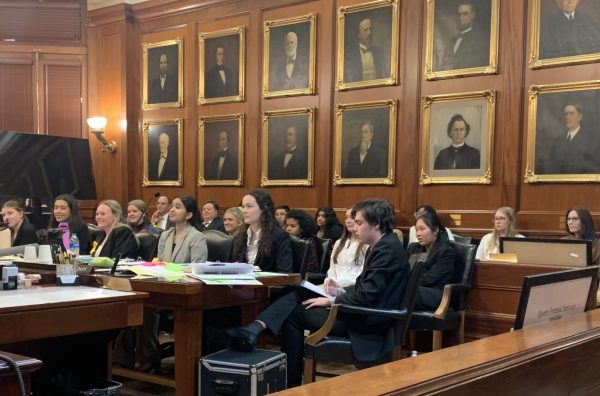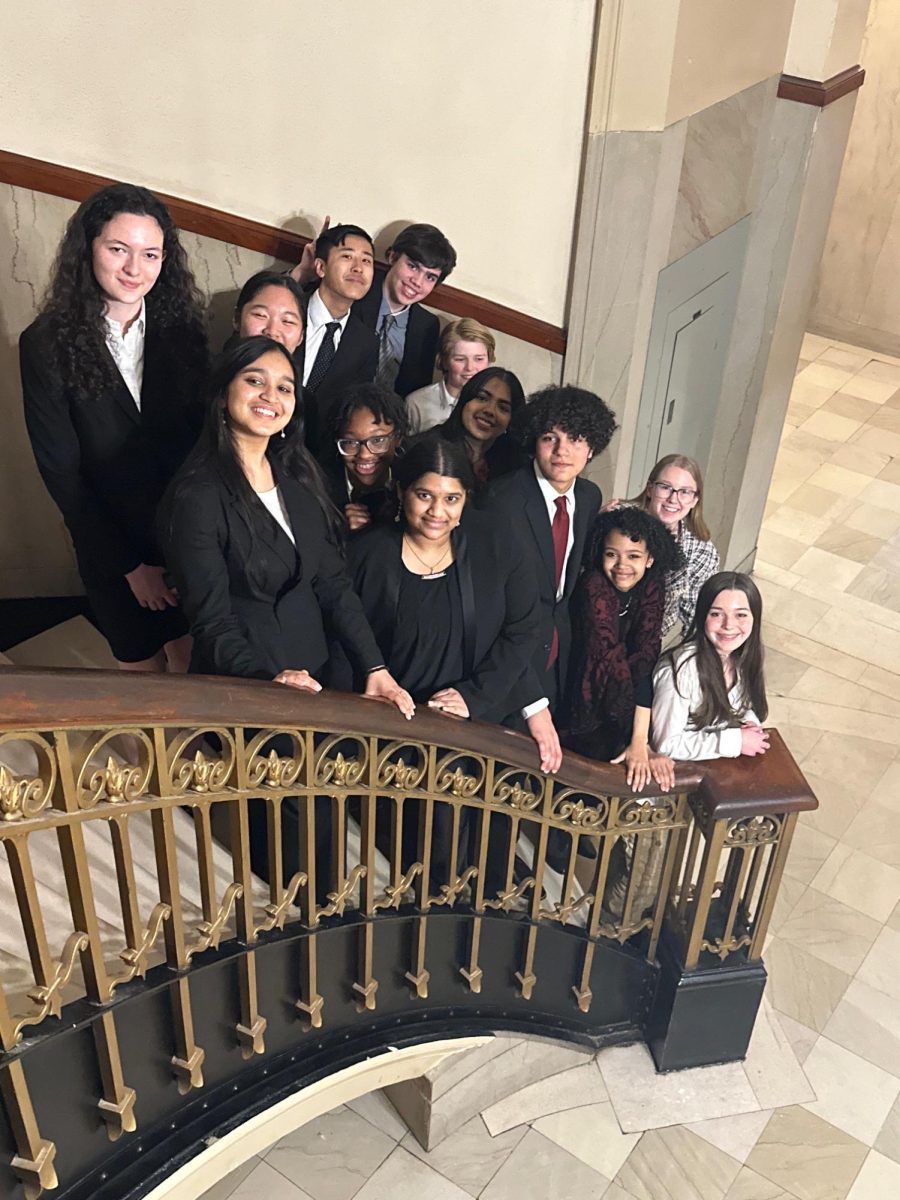Tensions are high within the courtroom — a battle of persuasion and logic. The team has been preparing their case for several months and it all comes down to this limited time at the stand. What will the verdict be?
The White Station Mock Trial team recently competed for three days during Feb. 22-24, where the fruits of their efforts would determine their standing among the teams of other schools in the district. Mock Trial is an intense, but engaging activity where students can practice skills such as public speaking and debate while offering various roles pertaining to different strengths.
“I would say it’s for people who like law, but it’s people who like to act as well,” Soumya Bandaru (12) said. “It’s like a great community bonding experience and practically anyone who’s interested to join—everyone has a type of skill that they can apply to Mock Trial—so really anyone and everyone can join.”
Because Mock Trial is versatile in the skills it requires, it has multiple different roles available to team members. For the past few years, the team has consisted of 12 people in total that are split into two groups of six. One group is the prosecution or plaintiff side with three people that are lawyers and three that are witnesses. In court, this side houses the person pressing the charges. It is the same for the defense group, which houses the person being charged with a crime. Although both lawyers and witnesses are crucial to the case, they contribute differently to the trial.
“The character that I played was Jules Capps,” Zakoi Lageman (11) said. “She was one of the witnesses … She was on trial for murder because she had ‘allegedly’ planned a break-in at her neighbor’s house because her neighbor popped off illegal fireworks that caused her dog to run away and get sprayed by a skunk.”
As a witness, Lageman is called to focus more on acting and playing a set character for the trial, rather than creating a case theory as lawyers have to do. These roles are determined at the beginning of the preparation period after tryouts are held to determine who will be on the team. Once the roles are established, practice begins.
“In January, we’ll have two practices a week and they’re each two and a half to three hours,” Bandaru said. “And then when we get into competition month, which is February, they’ll go up to three practices a week … This year, we had practices every single Tuesday from six to eight P.M., and then we had practices on Sunday from one to four P.M.”
The material for Mock Trial is taught by actual lawyers, known by participants as Mark Erskine and Gordon Pera. During their off hours, they dedicate time to preparing the team and organizing the procedures needed to select everyone’s role. Although the practices require a lot of work and studying, the coaches and leadership made sure to keep sessions fun and provide opportunities for bonding.
“My character was a race-walking valley girl,” Sadie Davis (10) said. “So there was a lot of fun with that, especially when our coach was giving me tips on what to do and he was using a valley girl accent, and this is like a middle-aged man … A lot of the team also met up at Panera [Bread] after school.”
Like most extracurriculars, Mock Trial has a schedule that is demanding to some degree which requires participants to learn how to balance between legal learnings and regular schoolwork. Because practices are later in the evening, it allows time in the afternoon for other clubs and homework, but there is still some responsibility required for effective time management.
“It’s after-after school,” Davis said. “It is an interesting sort of thing because I personally do [JROTC] unarmed drill team and other extracurriculars like Spruce Up Sparta … so there was some days like Tuesdays and Thursdays where I would basically go from unarmed practice ‘til 4:30, go home for maybe 30 minutes to an hour — by the time I got there [I] had to leave. So I got home, I got ready, I ate, maybe laid down for a few minutes, and then I went straight to mock trial. So, it was kind of like [I was] constantly going.”
Until the competition days finally arrived, many mock trial team members had schedules similar to this throughout the entire duration of the practice period. Teams are assigned a letter so they can’t be identified by their school to prevent any bias from the judges, but there were a few schools at the competition that team members could point out, such as Germantown High School and the White Station Mock Trial team’s longtime rival, St. Mary’s Episcopal School, who can be identified by the yellow ribbons they wear.
“We had two wins and two losses,” Bandaru said. “It’s kind of funny because the only school we’ve ever lost against is St. Mary’s, and so we have that little bit of rivalry … But, I feel like no one in our team was ever discouraged or affected by that because those two rounds that we did go against St. Mary’s, those were our best rounds.”
Now that the competition has passed, the mock trial team is focusing on its next recruiting period in late October/early November. Returning members of the team hope to have a successful turnout for the interest meeting.
“Whenever we get the case is when we have the dates finalized for competitions,” Lageman said. “But before that, we have like these … we’re changing it up for next year, but they’re gonna be like workshops where like we take an hour each week and we go on like a Zoom class or something and we like go over like trial things … so they’re not walking into tryouts without any information. We’re gonna change it up next year and try it make it more open for people.”
With two more wins out of a total of four rounds under their belt from this year, the White Station Mock Trial team is looking forward to next year’s competition and bonding with new members. The challenge of crafting a case theory and thrill of theatrical performances is something that appeals to many students and Mock Trial advertises having both.
“Don’t be afraid,” Bandaru said. “Everyone is so welcoming and everyone has an opportunity to learn … if this is something that you’re genuinely interested [in], I promise that you will have a lot of fun if you decide to join.”





































